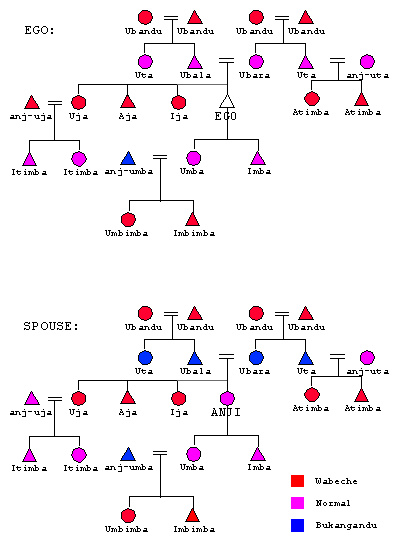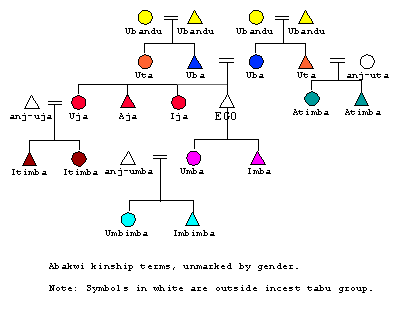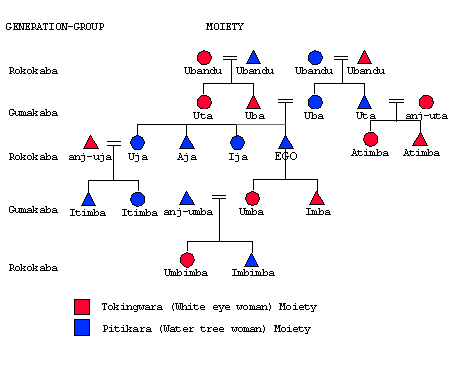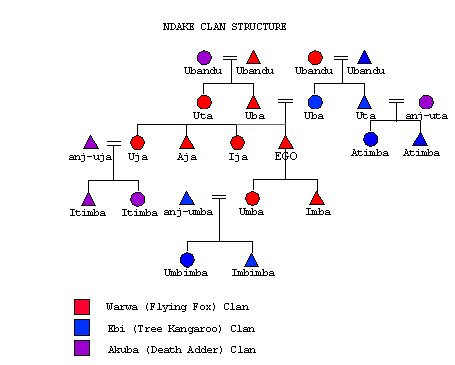
Abakwi Kinship

| Topics | Comments Page | Ndake Home Page | Abakwi Grammar
|
B'arani j'aba j'iboke jabul'abala-dwi.
-Ubani Tata
The following is a short description of the kinship terms of the Abakwi language and other details of kinship, pertaining primarily to the Ndake people
and to a lesser extent to the Edoba.
Topics
 Basic Kinship Terms
Basic Kinship Terms
 Joking / Avoidance
Relations
Joking / Avoidance
Relations
 Incest Tabu
Incest Tabu
 Moiety and Generation
Moiety and Generation
 Clan (Amwala)
Clan (Amwala)
Basic Kinship Terms
| TERM |
MEANING |
TITLE |
| Uba |
parent |
Baba |
| Imba |
child |
Mba |
| Umba |
eldest child |
Mbandu |
| Uja |
older sibling |
Jaja |
| Ija |
younger sibling |
Jamba |
| Aja |
twin |
Jaja |
| Uta |
aunt/uncle |
Tata |
| Atimba |
cousin |
Timba |
| Imbimba |
grandchild |
Mba |
| Umbimba |
eldest grandchild |
Mbandu |
| Ubandu |
grandparent |
Bandu |
| Itimba |
niece/nephew |
Timba |
All entries under TERM can take a gender modifier (-la, -ra):
Ubala father, Ubara mother.
Utala uncle, Utara aunt.
Ujala older brother, Ujara older sister.
Imbala son, Imbara daughter.
These terms are used to identify individuals, as Atimba d'Ufune, Ufune's cousin, or to refer to blood relations in general.
The prefix anj- is added to signify "married to", as in
anj-uja, partner of older sibling, and of course anj-i, spouse.
Entries under TITLE are normally post-fixed after a name, either in direct address (often formal) or third-person address (often respectful) and
do not normally take gender modifiers, except in the usage of children or when used in a humorous tone.
Bala, Bara are commonly used by children to call their parents.
Note on names: True names, or aya, are acquired during initiation. Young children are given names (wemboba) which usually refer to bugs or small animals, often contributed by older siblings or uncles and aunts.
Joking and Avoidance Relations
The concept of joking / avoidance kin is very important in Abakwi society.
Two individuals related in a certain way are expected to exhibit certain types of behavior,
ranging from extremely insulting "razzing" (wabeche) to extreme formality and politeness (bukangandu). These behaviors help smoothe over "rough spots" and avoid tension among relatives. The Ndake insist that both behaviors are necessary to a harmonious society.
Although the insults of wabeche are never taken seriously, some might be considered quite shocking to Western (and Eastern) ears, so I will not go into them in depth here.
Commonly, jokes about parentage, mock threats, ridicule, humorous name-play and imitations are traded back and forth in public whenever the opportunity presents itself.
Formal behavior on the other hand usually involves saying as little as possible, and even avoiding eye contact in some cases. Effusive displays of politeness would only occur in the context of wabeche, never as a form of bukangandu.

Incest Tabu
No relation within the basic kinship terms is acceptable (anj-terms are never basic). An atimba is
strictly an imba of an uja/ija/aja of an uba. More distant blood relations are acceptable, and often preferable to marriage to an
Edoba who has no family ties to the Ndake.

Moiety and Generation
The Ndake each belong to a moiety and a generation-group. The moieties, Tokingwara and Pitikara, are matrilineal and exogamous. The generation-groups (Rokokaba and Gumakaba) alternate with each generation and are enogamous. That is, each Ndake must marry within his generation-group, someone of the opposite moiety.

Clan (Amwala)
Clan membership involves a dietary, or rather hunting, restriction. A Warwa clan member may not hunt the flying fox, but may eat one if offered by a member of another clan. Other than a general encouragement to marry outside the clan, women are not significantly affected by clan membership. Men,
on the other hand, take membership quite seriously. The transmission of hunting skills and weapons, as well as ceremonial dance and chant, depend on
membership. All clans are patrilineal.

Return To: | Top Of This Page | Topics |
Comments Page | Ndake Home Page | Abakwi Grammar
|



